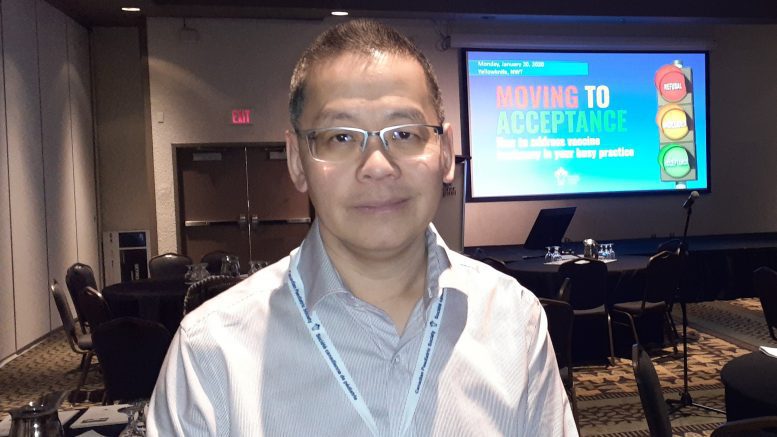A pediatrician who practices in the Northwest Territories as well as Alberta says the risk of contracting diseases or viruses far outweighs the risks associated with vaccines meant to prevent illnesses.
Dr. Sam Wong is also the incoming president of the Canadian Pediatric Society.
He says the percentage of vaccine-hesitant people, often referred to as anti-vaxxers, is similar among the Indigenous community as the non-Indigenous community.
“The (anti-vaxxer) message has been spread around the world on social media. I think whether you are Indigenous or non-Indigenous, a lot of the same reasons (against vaccinations) are there – parental concern for their child,” Dr. Wong said. “Every parent is concerned for their child so they listen to some of this (social media) messaging and they think they should be concerned.”
Dr. Wong was in Yellowknife for a workshop for health care providers.
Developed by the Canadian Paediatric Society, the workshop aims to:
- Define vaccine hesitancy and the factors that contribute to it.
- Explain how health care providers can influence vaccine hesitancy.
- Elicit and assess an individual’s reasons for vaccine hesitancy.
- Apply an effective, personalized communication strategy to address vaccine hesitancy, including appropriate risk communication.
- Develop an approach for interacting with the vaccine refuser.
According to a news release from the NWT Dept. of Health and Social Services, vaccine-preventable diseases remain a threat to health across Canada and globally.

image courtesy of com/stock
In 2019, the World Health Organization identified vaccine hesitancy as one of the ten most important threats to global health.
Dr. Wong says the idea that some anti-vaxxers have that vaccines are small does of a virus from someone else that you then allow to be put in your own system is not really accurate.
“We manage to isolate parts of the flu virus, the actual virus component that produces the immune response in the body, we take that without actually giving you the flu,” he said. “That is given to you in the vaccine and that vaccine then provokes an immune response. Then when you are exposed to the flu you are more likely to mount a stronger response to the flu or not even be affected by the flu.”
Dr. Wong agrees that in some cases, the vaccine only diminishes the chances of someone getting the flu by 30-50 per cent.
“But that 30-50 per cent protection may prevent someone from going into the intensive care unit (ICU) if you get the flu, or may prevent you from going into the hospital and you get a milder case of the flu. I’ll take the 30-50 percent than having zero percent,” Dr. Wong said. “There are always risks with everything. Even water has risks. Vaccines are 99.9 per cent safe. When you look at the flu itself, people are dying. Two young people died in Winnipeg recently. We’ve had double digit deaths from the flu in the U.S. That’s the risk.”
Nurses from across the Northwest Territories are attending the workshop as well as infectious disease experts, pediatricians, family physicians and pharmacists.
Also attending is the NWT Chief Public Health Officer, Dr. Kami Kandola.
Funding for the workshop was provided by the Public Health Agency of Canada.





